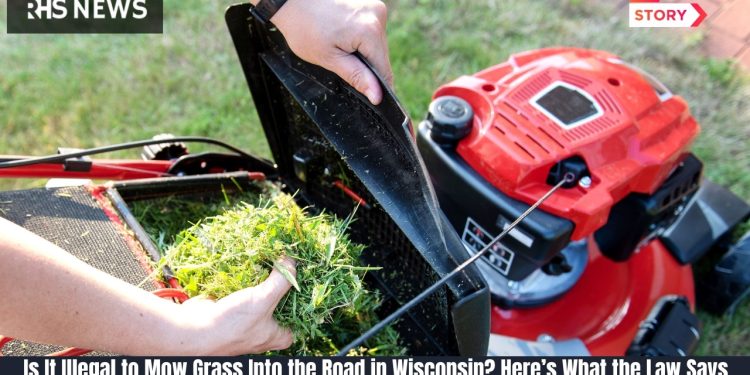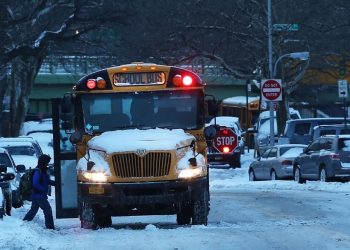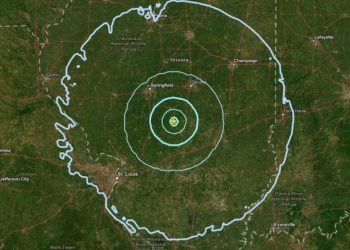The familiar drone of a lawnmower on a summer Saturday in Wisconsin is a sound that signals neighborhood pride and well-kept homes. From the bustling suburbs of Milwaukee to the quiet streets of Eau Claire, homeowners take to their yards to create a perfect carpet of green. As the mower pushes forward, a common sight follows: a spray of fresh, green clippings fanning out onto the hot asphalt of the street.
For many, it’s an unconscious habit, the easiest way to finish the edge of the lawn. For others, it’s a quick-and-dirty cleanup, assuming the clippings will just blow away or be washed away by the next rain. But have you ever stopped to wonder if this seemingly harmless act is actually against the law?
The short answer is a definitive yes. Blowing or leaving grass clippings on a public roadway in Wisconsin is illegal. It’s not just a matter of poor etiquette; it’s a violation of state law and numerous local ordinances, carrying potential fines and, more importantly, creating significant safety and environmental hazards.
Let’s dive deep into the legal statutes, the real-world dangers, and the best practices for being a responsible and law-abiding Wisconsin homeowner.
The Core of the Issue: Safety Hazards on Two Wheels and Four
To understand why this law exists, you first have to understand the danger. While a thin layer of grass might seem trivial to a two-ton SUV, it presents a treacherous and often invisible hazard for motorcyclists and bicyclists.
The Motorcycle Menace: Like Riding on Ice
For motorcycle riders, a patch of grass clippings on the road is the equivalent of hitting a patch of black ice. Here’s why:
- Loss of Traction: Freshly cut grass is wet and contains a high percentage of water. When spread across a paved surface, it creates a slick, low-friction layer between the tire and the asphalt. A motorcycle’s two small contact patches are incredibly sensitive to changes in road surface, and this layer can cause an instantaneous loss of traction.
- The Danger in Curves: The risk is magnified exponentially when a rider is navigating a curve. Imagine a motorcyclist enjoying a scenic ride through the winding roads of the Driftless Region near La Crosse. They lean into a turn, their body and bike balanced perfectly, only to hit an unseen patch of clippings left by a homeowner. The tires slip, and in a split second, the rider can lose control, leading to a serious or even fatal accident.
- Deceptive Appearance: Unlike a puddle, which riders are trained to spot, grass clippings can blend in with the roadside or appear as a harmless dusting. By the time a rider realizes the danger, it’s often too late to react safely.*
According to motorcycle safety experts, grass clippings are one of the most frequently cited “surprise” hazards that lead to single-vehicle accidents. It’s a preventable danger that puts lives at risk for the sake of a few moments of convenience.
Bicyclists and Other Vehicles
Bicyclists are similarly vulnerable. Their thin tires have even less surface area to grip the road, making a slide-out on grass clippings a common occurrence, leading to road rash, broken bones, and other injuries.
Even cars and trucks are not immune. While less likely to lose complete control, a vehicle hitting a thick, wet patch of clippings at speed, especially during a rainstorm, can experience a momentary hydroplane effect. This can be just enough to cause a driver to swerve or lose control during a critical braking or turning maneuver.
The Wisconsin State Law You Need to Know
The primary piece of legislation that makes depositing grass clippings on the road illegal is Wisconsin Statute § 346.94(5). The statute addresses “placing injurious substance on highway” and states:
“No person shall place or cause to be placed upon a highway any foreign substance which is or may be injurious to or damaging to any vehicle or part thereof, or which is or may be injurious to or damaging to any person.”*
While the statute doesn’t explicitly say “grass clippings,” the language is intentionally broad. Courts and law enforcement agencies widely interpret grass clippings as a “foreign substance” that is “injurious to… any person.” The slick surface they create poses a direct threat of injury, clearly falling under the statute’s purview.
A violation of this statute is a non-criminal offense, but it does come with a penalty. The forfeiture (the Wisconsin term for a fine for this type of violation) can range from 50to200, plus court costs. While not a massive sum, it’s an easily avoidable expense.
Local Ordinances: Bringing the Law Home
Beyond state law, hundreds of municipalities across Wisconsin have enacted their own local ordinances that more specifically and directly prohibit leaving lawn debris in the street. These local laws often exist to address another major problem caused by grass clippings: environmental damage and infrastructure strain.
Here’s how cities across the state are tackling the issue:
- City of Appleton: Appleton has been proactive in educating its residents. The city’s public works department frequently reminds citizens that leaving grass in the street is a violation of city ordinance. They emphasize that these clippings get washed into storm sewers, clogging them and carrying pollutants into the Fox River.
- City of Green Bay: Similar to Appleton, Green Bay prohibits sweeping or blowing yard waste into the street. Their focus is on protecting the water quality of the Fox River and the bay of Green Bay itself. Fines can be issued to property owners who violate the ordinance.
- City of Madison: In a city built around the Yahara Chain of Lakes (Mendota, Monona, Waubesa, Kegonsa), water quality is a paramount concern. Madison’s ordinances are strict. Grass clippings are rich in phosphorus and nitrogen—powerful fertilizers. When washed into the storm drains, which lead directly to the lakes, these nutrients fuel the explosive growth of algae and aquatic weeds. A single bushel of grass clippings contains enough phosphorus to produce over 30 pounds of algae, contributing to the green, murky blooms that plague the lakes each summer.
- Suburban Milwaukee Communities: Cities like Wauwatosa, West Allis, and Brookfield have similar ordinances. They stress not only the environmental impact but also the cost to taxpayers. When storm drains and culverts get clogged with grass and leaves, city crews must be dispatched to clear the blockages to prevent localized street flooding.
The message is consistent across the state: whether you live in a large city or a small village, there is almost certainly a rule on the books that makes blowing grass into the street illegal.
Beyond a Fine: The Specter of Civil Liability
Perhaps the most compelling reason to change your mowing habits isn’t the risk of a ticket, but the risk of a lawsuit.
If a motorcyclist or bicyclist crashes and is injured because of grass clippings you left in the road, you could be held personally liable for their damages. This falls under the legal principle of negligence. To prove negligence, the injured party would need to show:
- Duty of Care: You, as a property owner, have a duty to not create a hazard for others using the public roadway.
- Breach of Duty: By blowing grass into the road, you breached that duty.
- Causation: Your actions directly caused the accident and subsequent injuries.
- Damages: The rider suffered actual damages (medical bills, lost wages, pain and suffering, damage to their vehicle).
A successful personal injury lawsuit could result in a judgment that far exceeds the cost of a simple citation, potentially running into tens or even hundreds of thousands of dollars. Your homeowner’s insurance policy might cover it, but it could also lead to your rates skyrocketing or your policy being canceled. Keeping your grass off the road is a simple act that protects your financial future.
Best Practices for Responsible Lawn Maintenance
Understanding the law and the risks is the first step. The next is adopting safe and responsible mowing practices. Fortunately, it’s easy to do.
Mow in the Right Direction
This is the simplest and most effective technique. Instead of starting at the edge of your lawn and working your way in (which naturally throws clippings into the street for the first few passes), change your pattern.
- The Outward Spiral: Start in the center of your lawn and mow in an outward spiral. By the time you get to the edge, the mower will be positioned to throw the clippings back onto the lawn, not into the street.
- The First Passes Matter: If you prefer mowing in straight lines, simply make your first two or three passes along the curb or road edge with the mower’s discharge chute pointing away from the street and toward your lawn. This creates a “buffer zone,” and any clippings from the rest of your mowing will land on this cut area.
Embrace Mulching
A mulching mower is an excellent investment for the health of your lawn and the safety of your community. These mowers use special blades to cut grass blades into tiny pieces and force them back down into the turf. This has several benefits:
- Natural Fertilizer: The fine clippings decompose quickly, returning nitrogen and other vital nutrients to the soil. It’s essentially free, natural fertilizer.
- Improved Soil Health: Mulching helps retain soil moisture, reducing the need for watering.
- No Cleanup: There are no clippings to bag or blow, saving you time and effort.*
Use a Bagger
If mulching isn’t an option, using a bagger attachment is the next best choice. It collects all the clippings, preventing them from ever reaching the road. You can then add these clippings to your compost pile, use them as garden mulch (in moderation), or dispose of them according to your local municipality’s yard waste guidelines.
Clean Up Immediately
Mistakes happen. Sometimes, a sharp turn or an uneven patch of lawn sends a spray of clippings into the street despite your best efforts. When this occurs, don’t just leave it.
- Grab a leaf blower, broom, or rake.
- Immediately clean the clippings off the pavement and put them back onto your lawn or into a yard waste container.
It only takes a minute, but that minute could be the difference that prevents a serious accident.
The Final Word: A Matter of Community and Conscience
Keeping your grass clippings out of the road in Wisconsin is more than just following the law. It’s a fundamental act of being a good neighbor and a responsible citizen. It’s about recognizing that your property doesn’t end at the curb; your responsibility extends to ensuring that your actions don’t endanger others who share the community’s public spaces.
It’s for the motorcyclist from Green Bay who deserves to return home safely to their family. It’s for the kids on bicycles in your own neighborhood. It’s for the health of the beautiful lakes and rivers that define the Wisconsin landscape.
So the next time you pull out the mower, take a moment to look at the road. Make a conscious choice to aim your mower’s chute away from the pavement. It’s a small, simple change in habit that upholds the law, protects your finances, and, most importantly, could save a life.









